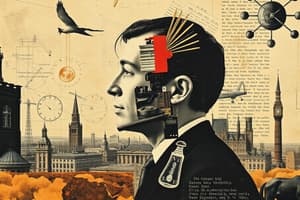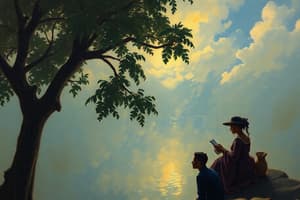Podcast
Questions and Answers
What is the role of the protagonist in a story?
What is the role of the protagonist in a story?
- To oppose the main character
- To carry out activities in the story (correct)
- To provide a secondary perspective
- To narrate the events in third person
Which point of view allows the narrator to know the thoughts and feelings of all characters?
Which point of view allows the narrator to know the thoughts and feelings of all characters?
- Second person
- Third person omniscient (correct)
- First person
- Third person limited
What defines the setting of a story?
What defines the setting of a story?
- The time, place, and duration of events (correct)
- The main conflict faced by the protagonist
- The moral lesson learned by characters
- The character's personal background
What does the theme of a story represent?
What does the theme of a story represent?
What is indicated by the tone of a piece of literature?
What is indicated by the tone of a piece of literature?
Which type of character is defined as having complex and multifaceted traits?
Which type of character is defined as having complex and multifaceted traits?
Which strategy is NOT recommended for fostering vocabulary learning?
Which strategy is NOT recommended for fostering vocabulary learning?
What is the significance of establishing small reading groups?
What is the significance of establishing small reading groups?
What does the term 'literature' primarily relate to?
What does the term 'literature' primarily relate to?
Which of the following is NOT considered a purpose of literature studies?
Which of the following is NOT considered a purpose of literature studies?
What characterizes literature's entertainment value?
What characterizes literature's entertainment value?
Which type of value does literature provide when it prompts historical consideration?
Which type of value does literature provide when it prompts historical consideration?
How does literature contribute to empathy in readers?
How does literature contribute to empathy in readers?
What value is associated with literature that encourages reflection on beauty?
What value is associated with literature that encourages reflection on beauty?
Why is analysis an important aspect of studying literature?
Why is analysis an important aspect of studying literature?
What is the political value of literature?
What is the political value of literature?
What is one way to create an environment that values literature?
What is one way to create an environment that values literature?
Which teaching principle can help deepen students' understanding of literature?
Which teaching principle can help deepen students' understanding of literature?
How can discussions among students enhance their literary experience?
How can discussions among students enhance their literary experience?
What is one significance of using different teaching principles in literature education?
What is one significance of using different teaching principles in literature education?
Which tone might an author choose for a literary work that addresses serious themes?
Which tone might an author choose for a literary work that addresses serious themes?
What is a defining characteristic of thriller literature?
What is a defining characteristic of thriller literature?
Which skill emphasizes the importance of analyzing and questioning information?
Which skill emphasizes the importance of analyzing and questioning information?
What is the primary intention of horror literature?
What is the primary intention of horror literature?
Which literary genre deals with tales of individuals falling in love?
Which literary genre deals with tales of individuals falling in love?
How does communication in literature primarily function?
How does communication in literature primarily function?
What blend defines historical fiction?
What blend defines historical fiction?
Which element is common across all 21st-century skills summarized in the 4Cs?
Which element is common across all 21st-century skills summarized in the 4Cs?
What does the realist style in literature prioritize?
What does the realist style in literature prioritize?
What is a key characteristic of science fiction novels?
What is a key characteristic of science fiction novels?
What distinguishes fantasy novels from other genres?
What distinguishes fantasy novels from other genres?
Dystopian literature is characterized by what type of society?
Dystopian literature is characterized by what type of society?
What is a significant feature of magical realism?
What is a significant feature of magical realism?
Which of the following best describes realist literature?
Which of the following best describes realist literature?
What is the primary goal of prose writing?
What is the primary goal of prose writing?
Which subgenres are included in drama?
Which subgenres are included in drama?
What is a defining element of poetry as a literary form?
What is a defining element of poetry as a literary form?
Study Notes
The Nature & Genre of Literature
- The word "literature" comes from the Latin word "litera" meaning "letters".
- Literature explores human ideas, thoughts, and emotions through written narratives.
Values of Literature
- Entertainment Value: Literature provides enjoyment and entertainment.
- Political Value: Literature can influence political thinking and behavior.
- Artistic Value: Literature promotes appreciation for beauty and human creativity through the power of language.
- Cultural Value: Literature helps us understand different cultures and historical contexts.
- Historical Value: Literature allows us to explore historical events, periods, and settings, offering insights into the past.
Purposes of Literature Studies
- Cultivating imagination: Literature helps develop our ability to create and visualize.
- Communication: Through analysis of literature, students improve their writing and communication skills.
- Analysis: Literature encourages critical thinking and the ability to analyze and understand complex information.
- Empathy: Literature fosters empathy and understanding of diverse perspectives on the world.
- Understanding: Literature provides a deeper understanding of the world and its complexities.
- Agility: Literature promotes problem-solving skills and the ability to think strategically.
21st Century Skills
- Critical Thinking: This skill involves analyzing information, forming conclusions, and questioning assumptions.
- Communication: This skill encompasses expressing ideas clearly and effectively in writing and speech.
- Collaboration: Working together effectively with others on a common project or goal.
- Creativity: This involves generating original ideas, exploring new perspectives, and thinking outside the box.
Literary Genres
- Fiction: This genre includes imagined stories featuring fictional characters, events, and situations.
- Nonfiction: This genre encompasses factual accounts, academic studies, and real-life events.
Fiction Subgenres
- Mystery: Mystery literature typically involves solving crimes, puzzles, or mysteries.
- Thriller: Thriller literature often features suspenseful, dark, and enigmatic storylines.
- Horror: This genre aims to evoke fear, shock, and even disgust in the reader, often exploiting common fears.
- Historical: Historical fiction draws from real historical events, settings, and characters to create fictional narratives.
- Romance: Romance literature focuses on love stories culminating in a happy ending, often with conflict and tension.
- Science Fiction: This genre involves futuristic technology, space exploration, and fantastical elements.
- Fantasy: This genre features mythical creatures, magical elements, and fictional worlds often drawing on mythology and folklore.
- Dystopian: This subgenre of science fiction portrays societies that are worse than our own, often highlighting social problems.
- Magical Realism: This genre blends realistic settings with magical elements, often blending the fantastical with the mundane.
- Realist: Realist literature focuses on portraying ordinary characters and events in a realistic and relatable manner.
Three Major Types of Literature
- Poetry: This form of literature uses specific meter and rhythm, often incorporating devices like rhyme, meter, and stanzas.
- Prose: Prose aims to tell stories with characters and plot, encompassing both fiction and nonfiction subgenres.
- Drama: This genre is written specifically for performance, typically featuring dialogue and action. Subgenres include comedy, tragedy, and tragicomedy.
Elements of Literature
- Plot: A sequence of events that unfold from beginning to end, including exposition, rising action, climax, falling action, and resolution.
- Setting: The time, place, and duration of the story.
- Characters: The individuals that perform actions in the story. This can include people, animals, or even inanimate objects.
- Point of View (POV): The perspective from which the story is told (First person, Second person, Third person limited, Third person omniscient).
- Theme: The underlying message or meaning of the story.
- Tone: The author's attitude towards the subject matter. Tone can be serious, humorous, formal, informal, etc.
Principles in Teaching Literature Studies
- Create a Valuing Environment: Foster an environment that values literature through discussions, activities, and positive encouragement.
- Teach Skills Effectively: Focus on crucial skills like fluency, phonics, phonemic awareness, and structural analysis.
- Establish Engaging Library Resources: Provide a diverse and well-stocked library that caters to students' interests and levels.
- Individualized Support: Interact with each student individually during reading and writing, assessing their progress and providing guidance.
- Encourage Book Talk: Promote discussions about books, fostering sharing and connection between students and teachers.
- Writing About Books: Encourage students to review books in journals, assign writing topics, and provide opportunities for collaboration.
Significance of Varied Teaching Principles
- Provides a framework for teaching and understanding literature effectively.
- Caters to diverse learning styles and maintains student engagement.
- Enhances language learning and linguistic awareness through exposure to different literary techniques.
- Fosters intellectual development through exposure to a diverse range of literary works.
Studying That Suits You
Use AI to generate personalized quizzes and flashcards to suit your learning preferences.
Related Documents
Description
Explore the fascinating world of literature, from its origins to its diverse values in society. This quiz covers the various purposes of studying literature and the impact it has on culture, politics, and historical understanding. Test your knowledge on how literature shapes our imagination and communication skills.




